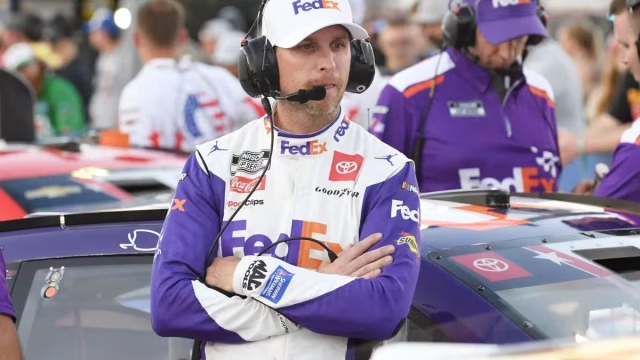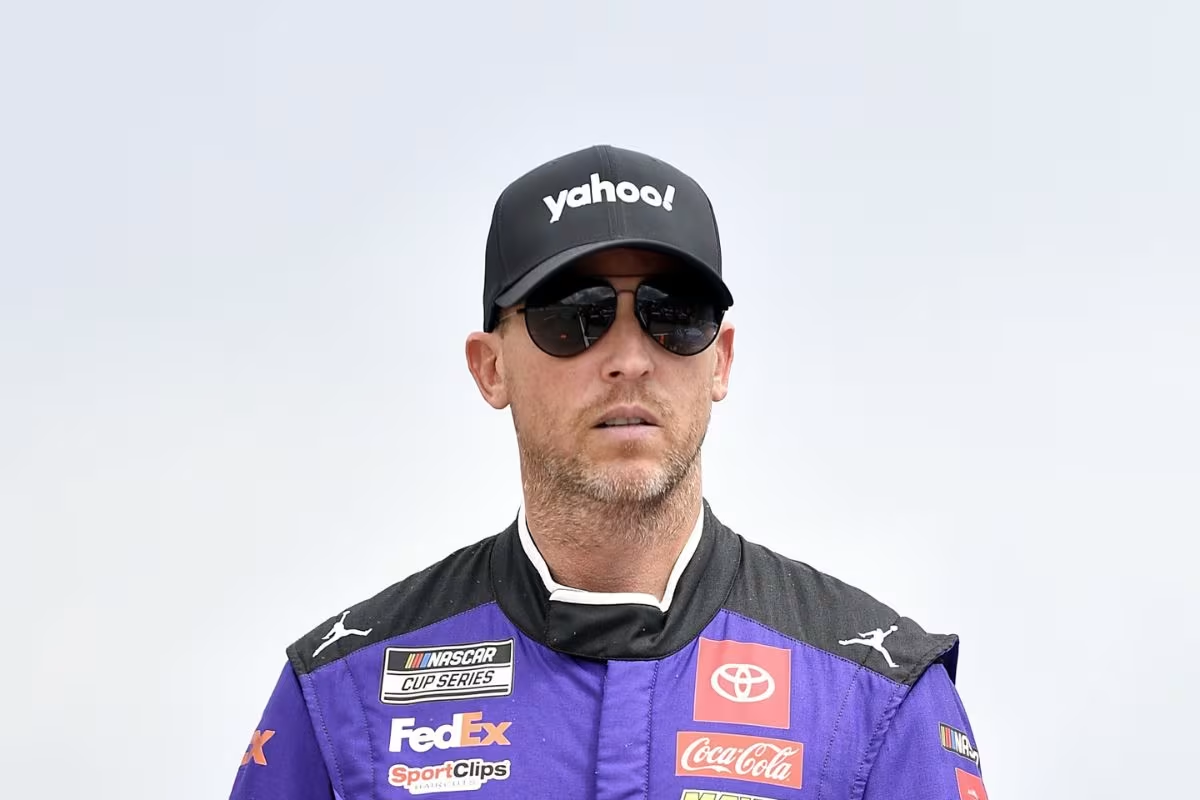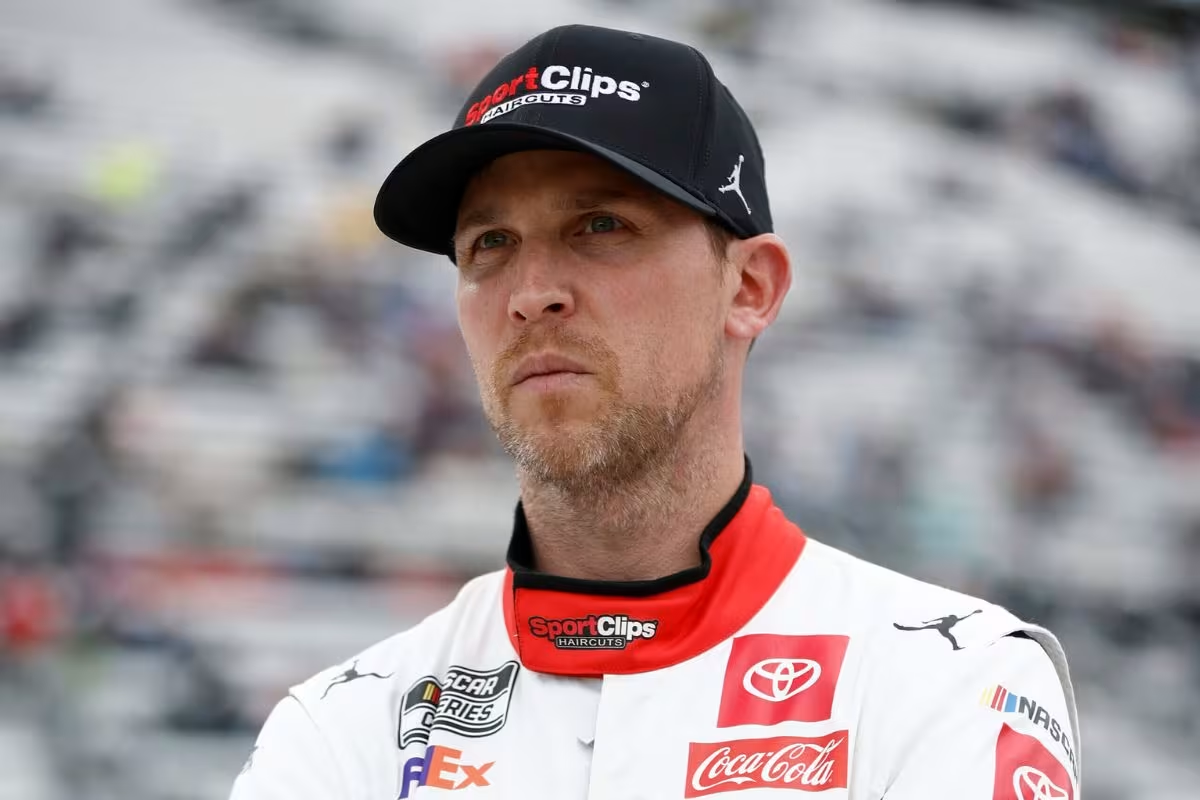Denny Hamlin Calls Out JGR’s Pit Crew: Denny Hamlin‘s recent review of Joe Gibbs Racing‘s pit crew shows a pressing issue within the organization: the review need for depth and efficiency in high-pressure scenarios. Following a disappointing outing at the Kansas playoff race, Hamlin’s frustrations clear contrast between the resources available to JGR and the operational draw backs he faces at 23XI Racing. His comments raise significant questions about the consequence of pit crew performance on overall competitiveness in the sport.
Key Highlights
- Denny Hamlin scolded JGR’s pit crew for lacking depth and efficiency during crucial race moments, impacting overall performance.
- The recent struggles of Hamlin’s #11 pit crew at Kansas Speedway highlighted concerns over their effectiveness in high-pressure situations.
- JGR has a larger pool of pit crew members, yet Hamlin feels this hasn’t translated into optimal performance during races.
- Hamlin’s frustrations stem from a series of penalties and bad luck, emphasizing the need for improved pit crew effectiveness.
- Ensuring better collaboration and performance from the pit crew is essential for Hamlin to remain competitive in the playoffs.
NASCAR As a Team Sport And Denny Hamlin’s Pit Crew Struggles
NASCAR is fundamentally a team sport, where the synergy between diverse roles—driver, crew chief, spotter, and pit crew—determines success on the racetrack. The interplay among these key players is essential, as each role contributes to the complete performance of the vehicle and driver during a race.
While the driver is often the face of the operation, it is the collaboration among the entire team that can say them toward victory or lead to missed opportunities.
In this context, the pit crew emerges as a vital component, capable of influencing race outcomes considerably. Their efficiency during pit stops can mean the difference between maintaining position or losing valuable time to competitors.
Recent events have highlighted this reality, particularly with Denny Hamlin‘s experience at the Kansas Speedway. The struggles of the #11 pit crew showed not just in isolated incidents but in multiple missteps that hampered Hamlin’s ability to compete effectively.
These failures shows how a lack of coordination can stop even the most skilled drivers. The consequences of such inefficiencies extend beyond a single race they resonate through the championship standings and team confidence.
As Hamlin’s frustrations demonstrate, the success of a driver hinges not only on their individual talent but also on the collective efficacy of the team. In a sport defined by narrow margins, the ability to depend on a pit crew is big for achieving desired outcomes.
Hamlin’s Frustration After Playoff Race
Denny Hamlin’s post-race reflections after the playoff race revealed a deep sense of frustration that extended beyond the track.
“I’m not in it mentally; I can tell you that.”-(hamlin)
This admission highlights a period marked by adversity, as Hamlin struggles with a series of misfortunes that have plagued his season.
His frustrations were increased by a pit-road issue during the race, an area he has drawn direct comparisons to the performance of his 23XI Racing pit crew versus that of JGR.
The cumulative impact of the following factors has left him disheartened:
- L2 Penalty: A notable penalty cost him 10 playoff points, limiting his competitive edge.
- Contractual Struggles: Ongoing disputes with NASCAR regarding the charter deal have created extra stress.
- Streak of Bad Luck: Since the break after Olympics, multiple incidents have compounded his woes.
- Pit Crew Dynamics: He expressed the need for improved performance from his team during vital moments.
Hamlin’s candidness reflects a broader concern about team dynamics and the mental toll that compounded setbacks can inflict on a driver.
Hamlin’s Reflections On Pit Crew Resources At JGR and 23XI
The contrasting resources available to pit crews at Joe Gibbs Racing (JGR) and 23XI Racing have become a main point in Denny Hamlin‘s analysis of his team’s performance.
Hamlin’s reflections reveal a clear disparity in personnel depth, which directly impacts pit crew efficiency during moments. The #11 pit crew at JGR is often celebrated as one of the best in the business, evidenced by their big role in securing Hamlin’s victory at Richmond. However, during a recent playoff race, that same crew fell short of expectations, showing Hamlin to question the consequence of resource distribution.
“We’re not as deep personnel-wise at Joe Gibbs Racing is. So I don’t know how many pit crew members JGR has—50? 60? like they supply tons of pit crews, and so they’ve got a huge pool where. Just a few years ago at 23XI, we hired 10 guys; that’s all we could get, and feel comfortable with with 10 guys. So that’s 5 for each team, and so there was no depth. Over time, we build some depth in our teams and we continue to improve that.”-(hamlin)
JGR possesses a substantial pool of pit crew members—estimated between 50 to 60—allowing for a depth that can sustain performance under pressure. In contrast, Hamlin pointed to the nascent stages of 23XI Racing, where the hiring of just ten crew members meant a limited pool of talent. This lack of depth has historically the team’s ability to consistently deliver top-tier service during races.
As Hamlin noted, while 23XI has begun to build its roster, the expedition towards achieving the same level of pit crew effectiveness as JGR remains ongoing.
Hamlin’s insights a critical element of competitive racing: the need for skilled personnel to navigate the complexities of tough environments.
The disparity in resources between JGR and 23XI not only shapes the teams’ capabilities but also highlights the potential for growth and improvement as 23XI continues to evolve.
Hamlin’s Expectations For Talladega Playoff Race
In the tough environment of the Talladega playoff race, expectations are particularly shows as drivers seek to navigate the complexities of track position and strategy. Denny Hamlin, currently 11 points above the cutline, recognizes the significant nature of this race in the context of the ongoing playoffs. As he prepares for Talladega, his focus is on more points while maintaining a competitive edge.
“I mean, you’re gonna see everyone battling to try to get the stage points and win the race. It’s one where certainly you’re not gonna have varying strategies. But it’s going to be a track position race in my opinion, and you wanna race up towards the front and control the race”-(hamlin)
Hamlin’s insights indicate a clear strategy as he anticipates the dynamics of the race:
- Track Position: Maintaining a position throughout the race will be essential, as it directly impacts the ability to secure stage points.
- Conservative Racing: With the playoffs highlighting points accumulation, expect drivers to race conservatively rather than take unnecessary risks.
- Control of the Race: Hamlin stresses the need to control the race, asserting that staying near the front will be critical for success.
- Unified Strategy: He foresees a lack of varying strategies among playoff drivers, suggesting a more uniform approach focused on stage points.
Given the outcomes of previous races, where non-playoff drivers have secured victories, Hamlin’s strategy will be centered on caution and precision.
The Talladega race presents an opportunity for Hamlin to solidify his standings in the playoffs. As the competition intensifies, mastering the intricacies of this race will be big for Hamlin and his team.
News in Brief: Denny Hamlin Calls Out JGR’s Pit Crew
Denny Hamlin’s criticism of Joe Gibbs Racing’s pit crew raises important concerns about their depth and efficiency, especially after the Kansas playoff race. The difference in resources between JGR and 23XI Racing highlights how crucial it is to perform well under pressure. With the Talladega playoff race coming up, improving pit crew operations is essential for boosting competitiveness. Fixing these issues could be key to the success of both Hamlin’s team and JGR in upcoming races.
ALSO READ: Denny Hamlin’s Take on NASCAR’s Kansas Controversy: A Call for Change



